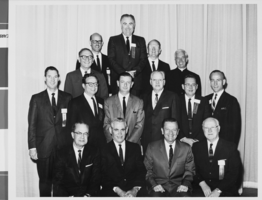Search the Special Collections and Archives Portal
Search Results
Audrey Wickman oral history interview
Identifier
Abstract
Oral history interview with Audrey Wickman conducted by Joanne L. Goodwin on June 24, 1996 for the Women's Research Institute of Nevada (WRIN) Las Vegas Women Oral History Project. Wickman opens her interview by discussing her upbringing in Kentucky, and her young adult life in Colorado. Wickman then talks about moving to Las Vegas, Nevada with her husband during the Depression to look for employment. She then describes the Mesquite Club in detail, including its members and the club's activities from the 1930s to 1950s. Audrey Swenson, Wickman's daughter, joins the interview at the end. She discusses what the Mesquite Club was like in the 1950s through 1970s, and being raised in Las Vegas as a child.
Archival Collection
John Theodore Gilcrease oral history interviews
Identifier
Abstract
Oral history interviews with John Theodore Gilcrease conducted by Robert McCracken on October 09 and 10, 2000 and March 21, 2001 for the Women's Research Institute of Nevada (WRIN) on behalf of the Tule Springs Preservation Committee. Gilcrease opens his interview by discussing his family's lineage and Irish heritage. Gilcrease then explains how his family purchased farm land in the Tule Springs, Nevada area in 1920. He discusses how his family modified and changed the land, their irrigation system, and the animals they bred. Gilcrease goes on to talk about the development of the farm and how the development of Las Vegas, Nevada affected the property. Gilcrease recalls the life of his farm and family from the early the 1900s to the 1960s and talks about other prominent farming families in the area.
Archival Collection
Carol Corbett Papers
Identifier
Abstract
The Carol Corbett Papers, 1981-2006, contain papers from Nevada organizations, Clark County offices, and general biographical and geographical information. Included are Corbett Recorder Scholarship and Hoggard Memorial Scholarship data, files for the Clark County Recorder's Office, Clark County Credit Union, Records Management Policies and Procedures, a District Attorney Opinion Project, Nevada Women's History Project, Nevada History Archives, and the State Historical Records Advisory Board (SHRAB) files. There is also information on gay issues. Materials also include slides and photographs.
Archival Collection
Bruce Turner Collection on Transportation and Water in Southern Nevada
Identifier
Abstract
The Bruce Turner Collection on Transportation and Water in Southern Nevada contains reports, publications, legal files, project proposals, journal articles, financial reports, photographs, and maps concerning transportation policy and water usage in Southern Nevada from 1980 to 2014. The collection contains documents from organizations including the Regional Transportation Commissions of Clark County and Southern Nevada, the Clark County Department of Air Quality and Environmental Management, Clark County Comprehensive Planning, the Urban Land Institute, the City of Las Vegas Neighborhood Services Department, the Southern Nevada Water Authority, and the Las Vegas Valley Water District.
Archival Collection

Interview with Layton James O'Neill, July 23, 2004
Date
Archival Collection
Description
Text
Jean Ford Papers
Identifier
Abstract
The Jean Ford Papers (1958-1996) include political documents, campaign materials for Jean Ford's political campaigns, and materials pertaining to campaign issues such as health services, general improvement districts, and parks and recreation. There is extensive material on Red Rock National Conservation Area, Lake Mead National Recreation Area, and the National Issues Forum. Women's issues cover the years 1964-1981 and contain information relating to the League of Women Voters, Equal Rights Amendment (ERA), and International Women's Year (IWY), as well as Anti-ERA and Anti-IWY materials.
Archival Collection
Junior League of Las Vegas' Records on the Morelli House Preservation Project
Identifier
Abstract
The Junior League of Las Vegas' Records on the Morelli House Preservation Project contains the records of the Junior League of Las Vegas and the organization's efforts to preserve the Morelli House in downtown Las Vegas, Nevada from 1997 to 2017. Records are comprised of various internal and external planning documents, research files, advertising and publicity, correspondence, grant files, and photographs. Also included in this collection are scans of original planning documents and drawings used by Las Vegas, Nevada architect, Hugh E. Taylor, during construction of the Morelli House in the 1950s.
Archival Collection

Photograph of Mayor Oran K. Gragson and other attendees of the International Exposition of Flight and General Aviation Conference, circa 1960s
Date
Archival Collection
Description
Image
Vera Moore (True Beginnings/Divinity House) oral history interview conducted by Kelliann Beavers and Elia Del Carmen Solano-Patricio: transcript
Date
Archival Collection
Description
From the Lincy Institute "Perspectives from the COVID-19 Pandemic" Oral History Project (MS-01178) -- Community organization interviews file.
Text
Harrah’s Entertainment Corporate Archives
Identifier
Abstract
The Harrah’s Entertainment Corporate Archives (dating from 1811 to 2004 with the bulk of the materials dating from 1940 to 2000) contain the promotional and corporate files of Harrah’s Entertainment Inc. and its predecessors, as well as Bill Harrah’s personal papers and card game collection. The materials were compiled and developed as a corporate archive by Harrah's Entertainment, Inc.’s Corporate Communications Department. The collection is primarily comprised of casino and employee periodicals, reports, manuals, promotional files, ephemera, and newspaper articles that document Bill Harrah’s casinos in Reno, Nevada and Lake Tahoe as well as Harrah’s Inc., Holiday Inns, Inc., Holiday Corporation, the Promus Companies, and Harrah’s Entertainment, Inc. Also included are photographs that document the construction of Harrah’s properties, business operations, the people who worked and performed at Harrah’s properties, and Bill Harrah’s automobile collection. The collection also contains Bill Harrah’s collection of playing cards and card games. Also included are photographs of the Harrah family.
Archival Collection
